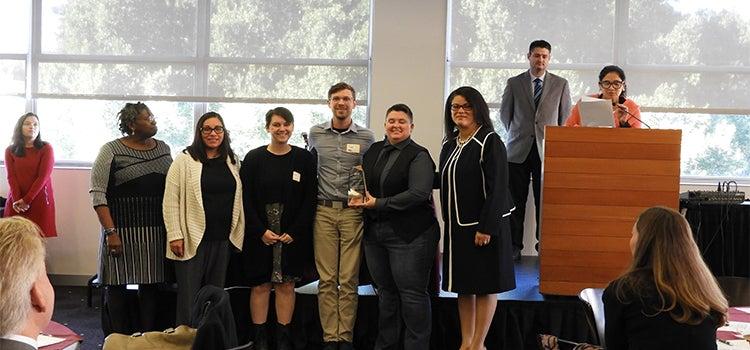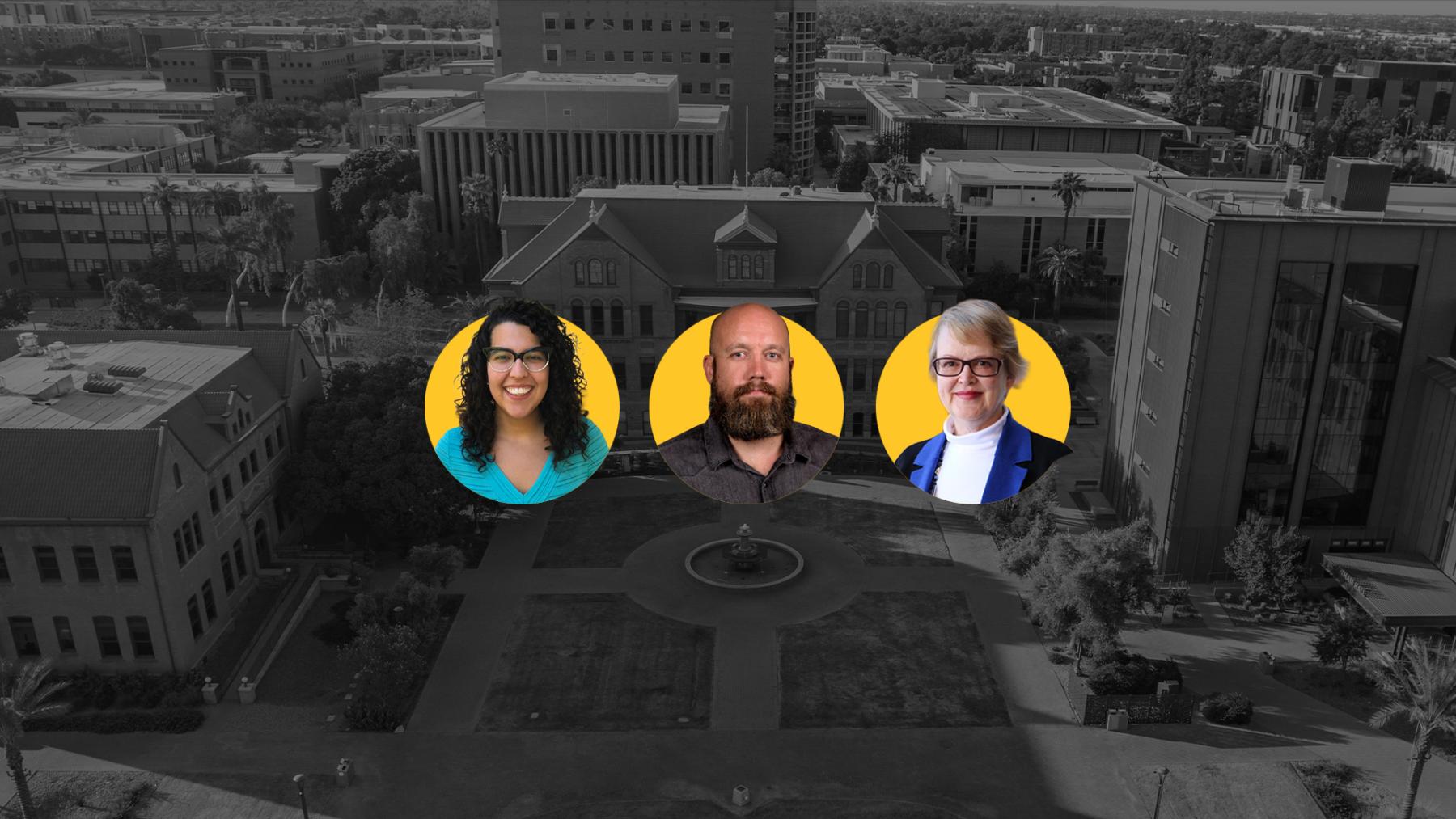
Graduate College's LGBTQ+ mentoring program honored
The Graduate College’s rapidly-expanding HUES LGBTQ+ mentoring program, which launched in August 2017, was honored with the Catalyst Award.
The Catalyst Awards are an annual recognition ceremony held by the Committee for Campus Inclusion (CCI) and the Office of Inclusion and Community Engagement. This November, the committee recognized the impact HUES mentors have had for students at ASU.
“The work of inclusivity is woven into so much of what we do at ASU as a part of its charter,” said Stanlie James, vice provost for Inclusion and Community Engagement. “The mandate of CCI is to educate around issues of inclusion and raise the visibility of efforts university-wide to create a sustained ecosystem of inclusivity and equality.”
The Catalyst Awards are CCI’s way of acknowledging and recognizing efforts to inspire and ignite social transformation and inclusion beyond the scope of expectation.
“It’s such an honor to be nominated,” said Shannon Lank, a HUES mentor and frequent panelist at HUES community programming. “And it was an even bigger surprise to receive the award.”
For Zachary Reeves-Blurton, HUES creator and program manager for mentoring initiatives within the Graduate College, watching the mentors walk to the podium to shake hands with Vice Provost Stanlie James and receive the award while their mentees cheer in the audience was a defining moment.
“This is an exceptional group of mentors,” he said. “I’ve talked to their mentees, chatted with students in the halls after the panel discussions [mentors frequently take part in] — it’s tangible, the impact they are having on their students.”
Partnering members of the LGBTQ+ faculty, staff and graduate student communities with self-identified LGBTQ+ undergraduate and graduate students, HUES offers one-to-one mentoring, community engagement and programming to foster support in identity navigation and community-building.
With an estimated 6,000 to 10,000 undergraduate and graduate students at ASU (based on current national statistics) identifying as lesbian, gay, bisexual, transgender or queer (LGBTQ+), it is important that the navigation of multiple identities be a part of any larger conversation around the academic support and retention of our graduate students, says Reeves-Blurton.
“The Graduate College has supported marginalized or underrepresented student populations for decades,” said Jennifer Cason, Director of Graduate Student Support Resources at the Graduate College. “Traditionally, our fellowships and structured classes such as our Interdisciplinary Research Colloquium (IRC) have supported self-identified first-generation and cultural minority students.”
Over the past several years, Cason states, “We’ve seen an uptick in students struggling to balance navigation of their sexual and/or gender identities or orientations with the rigors of their academic coursework and career development.”
To that end, the Graduate College has embarked on an expansion of its mentoring and professional development portfolio with programs such as HUES.
“What we’ve found through our community engagement programming and targeted mentoring within our underrepresented minority student communities,” explained Reeves-Blurton,“ is that we’re having similar conversations in these various communities; in our first-generation communities, in our ethnic minority communities, in our LGBTQ+ community. Our hope is that the conversations started in these mentoring groups are carried out into the larger graduate community, that this culture of mentorship ripples out into the larger student landscape.”
‘Finding a new continent’ through mentorship at ASU
For many graduate students in HUES, this is their only university engagement outside their own department.
“Everybody I hang out with is in my academic program,” said Jay (pseudonym), a doctoral student.
“Beyond that, I have some friends I have met at academic conferences or when I did my internship…as well as people I met at other universities I have been to.”
Despite his close academic working relationship with his advisor at ASU and finding support after coming out to peers in his program, Jay still struggled to find others in his primarily heterosexual, male-dominated field with whom he could discuss matters of identity.
When he learned about HUES, Jay signed up, anxious to begin making meaningful connections within the ASU LGBTQ+ community.
“It’s like you find a new continent,” he explained. “Like you find a new area…something you’ve never known about before.”
Like Jay, Bea, a continuing doctoral student, has been introduced by her mentor to a wider network within the ASU LGBTQ+ community, and this, in turn, has provided her with inspiration and a renewed confidence that impacts her academic focus.
“It’s great seeing who they [LGBTQ+ faculty and community members] are, that they can be really confident being gays and lesbians. And they’re so achieved…it’s quite amazing.”
“She’s been just a great example,” said Bea of her mentor. “It helped me visualize a life, you know?”
The stories of Jay and Bea, whom, along with their mentors, he interacts with regularly, are Reeves-Blurton’s motivation as he pushes to expand HUES.
“Our larger goal is to expand our programming, allowing a larger student and faculty community to join the Graduate College in conversations around inclusivity,” said Reeves-Burton.
For more information or to apply to be a mentor or mentee, visit graduate.asu.edu/professional-development/mentoring.
More stories from the Graduate Insider

Finding your flow: Managing the graduate writing process
Graduate writing can feel like a marathon—long, demanding, and full of unexpected detours. But as Tristan Rebe, Program Manager for the Graduate Writing Center, reminded students in the Grad15: Managing the Writing Process webinar, writing is not about perfection—it’s about progress. “The best dissertation is a done dissertation,” Rebe said, quoting Robert Frost: the best way out is through.

Promoting resilience and well-being in Ghana — and across the globe

From practice to presentation: How to deliver a winning faculty job talk
Giving a job talk can feel like the most high-stakes presentation of your academic job search. It’s not just a research seminar—it’s your opportunity to demonstrate vision, communication skills, and fit within a department. In a recent Lunch and Learn, faculty members Associate Professor in School of International Letters and Cultures, Anita Huizar-Hernandez, Professor in School of Life Sciences Jeffrey Jensen, and Professor in Department of Physics Patricia Rankin shared concrete strategies to help graduate students and postdocs succeed as future faculty candidates.